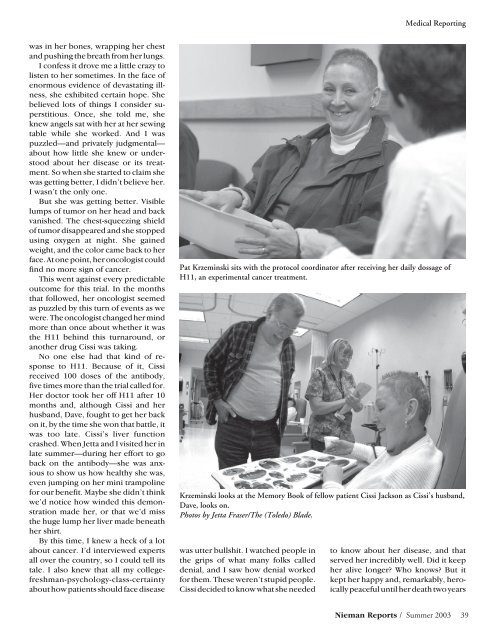summer-2003-Part 2-live - Nieman Foundation - Harvard University
summer-2003-Part 2-live - Nieman Foundation - Harvard University
summer-2003-Part 2-live - Nieman Foundation - Harvard University
- No tags were found...
Create successful ePaper yourself
Turn your PDF publications into a flip-book with our unique Google optimized e-Paper software.
Medical Reportingwas in her bones, wrapping her chestand pushing the breath from her lungs.I confess it drove me a little crazy tolisten to her sometimes. In the face ofenormous evidence of devastating illness,she exhibited certain hope. Shebelieved lots of things I consider superstitious.Once, she told me, sheknew angels sat with her at her sewingtable while she worked. And I waspuzzled—and privately judgmental—about how little she knew or understoodabout her disease or its treatment.So when she started to claim shewas getting better, I didn’t believe her.I wasn’t the only one.But she was getting better. Visiblelumps of tumor on her head and backvanished. The chest-squeezing shieldof tumor disappeared and she stoppedusing oxygen at night. She gainedweight, and the color came back to herface. At one point, her oncologist couldfind no more sign of cancer.This went against every predictableoutcome for this trial. In the monthsthat followed, her oncologist seemedas puzzled by this turn of events as wewere. The oncologist changed her mindmore than once about whether it wasthe H11 behind this turnaround, oranother drug Cissi was taking.No one else had that kind of responseto H11. Because of it, Cissireceived 100 doses of the antibody,five times more than the trial called for.Her doctor took her off H11 after 10months and, although Cissi and herhusband, Dave, fought to get her backon it, by the time she won that battle, itwas too late. Cissi’s <strong>live</strong>r functioncrashed. When Jetta and I visited her inlate <strong>summer</strong>—during her effort to goback on the antibody—she was anxiousto show us how healthy she was,even jumping on her mini trampolinefor our benefit. Maybe she didn’t thinkwe’d notice how winded this demonstrationmade her, or that we’d missthe huge lump her <strong>live</strong>r made beneathher shirt.By this time, I knew a heck of a lotabout cancer. I’d interviewed expertsall over the country, so I could tell itstale. I also knew that all my collegefreshman-psychology-class-certaintyabout how patients should face diseasePat Krzeminski sits with the protocol coordinator after receiving her daily dossage ofH11, an experimental cancer treatment.Krzeminski looks at the Memory Book of fellow patient Cissi Jackson as Cissi’s husband,Dave, looks on.Photos by Jetta Fraser/The (Toledo) Blade.was utter bullshit. I watched people inthe grips of what many folks calleddenial, and I saw how denial workedfor them. These weren’t stupid people.Cissi decided to know what she neededto know about her disease, and thatserved her incredibly well. Did it keepher a<strong>live</strong> longer? Who knows? But itkept her happy and, remarkably, heroicallypeaceful until her death two years<strong>Nieman</strong> Reports / Summer <strong>2003</strong> 39
















